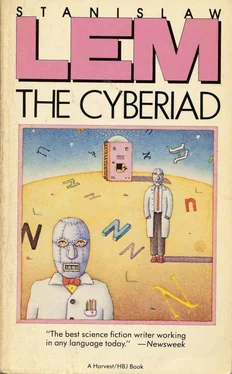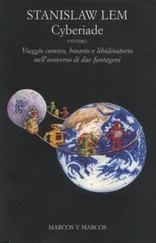In point of fact he no longer possessed any senses; they had decayed and crumbled to dust over the centuries, since Entropy, the bride of Chaos, is a cruel and implacable mistress. Consequently Mymosh could not see his mother-puddle, nor his brother-mud, nor the whole, wide world, and had no recollection of what had happened to him before, and generally was now capable of nothing but thought. This alone could he do, and so devoted himself wholeheartedly to it.
—First I ought—he told himself—to fill this void that is I, and thereby dispel its insufferable monotony. So let us think of something, for when we think, behold, there is thought, and nought but our thought has existence.— From this one could see he was becoming somewhat presumptuous, for already he referred to himself in the first person plural.
—But wait—he then said—might not something still exist outside myself? We must, if only for a moment, consider this possibility, though it sound preposterous and even a little insane. Let us call this outsideness the Gozmos. Now, if there is a Gozmos, then I must be a part and portion of it!
Here he stopped, pondered the matter awhile, and finally rejected that hypothesis as wholly without basis or foundation. Really, there was not a shred of evidence in its favor, not a single, solid argument to support it, and so, ashamed he had indulged in such wild, untutored speculation, he said to himself:
—Of that which lies beyond me, if anything indeed there lie, I have no knowledge. But of that which is within, I do, or rather shall, as soon as I think something into thought, for who can know what I think, by thunder, better than myself?!— And he thought and thought, and thought of the Gozmos again, but this time thought of it inside himself, which seemed to him a far more sensible and respectable solution, well within the bounds of reason and propriety. And he began to fill his Gozmos with various and sundry thoughts. First, because he was still new at it and lacked skill, he thought out the Beadlies, who grambled whenever they got the chance, and the Pratlings, who rejoiced in filicorts. Immediately the Pratlings battled the Beadlies for the supremacy of filicortion over gramblement, and all Mymosh got for his world-creating pains was an awful headache.
In his next attempts at thought creation, he proceeded with greater caution, first thinking up elements, like Brutonium, a noble gas, and elementary particles, like the cogiton, the quantum of intellect, and he created beings, and these were fruitful and multiplied. From time to time he did make mistakes, but after a century or two he grew quite proficient, and his very own Gozmos, sound and stable, took shape in his mind’s eye, and it teemed with a multitude of entities, things, beings, civilizations and phenomena, and existence was most pleasurable there, for he had made the laws of that Gozmos highly liberal, having no fondness for strict, inflexible rules, the sort of prison discipline that Mother Nature imposes (though of course he’d never heard of Mother Nature).
Thus the world of Selfbegotten was a place of caprice and miracle; in it something might occur one way once, and at another time be altogether different—and without any special rhyme or reason. If, for example, an individual was supposed to die, there were always ways of getting around it, for Mymosh had firmly decided against irreversible events. And in his thoughts the Zigrots, Calsonians, Flimmeroons, Jups, Arligynes and Wallamachinoids all prospered and flourished, generation after generation. During this time the haphazard arms and legs of Mymosh fell off, returning to the garbage from which they’d come, and the puddle rusted through the narrow waist, and his body slowly sank into the stagnant mire. But he had just put up some brand-new constellations, arranging them with loving care in the eternal darkness of his consciousness, which was his Gozmos, and did his level best to keep an accurate memory of everything that he had thought into existence, even though his head hurt from the effort, for he felt responsible for his Gozmos, deeply obligated, and needed. Meanwhile rust ate deeper and deeper into his cranial plates, which of course he had no way of knowing, and a fragment from Trurl’s jug, the selfsame jug that thousands of years ago had called him into being, came floating on the puddle’s surface, closer and closer to his unfortunate head, for only that now remained above the water. And at the very moment when Mymosh was imagining the gentle, crystal Baucis and her faithful Ondragor, and as they journeyed hand in hand among the dark suns of his mind, and all the people of the Gozmos looked on in rapt silence, including the Beadlies, and as the pair softly called to one another—the rust-eaten skull cracked open at the touch of the earthenware shard, pushed by a puff of air, and the murky water rushed in over the copper coils and extinguished the current in the logic circuits, and the Gozmos of Mymosh the Selfbegotten attained the perfection, the ultimate perfection that comes with nothingness. And those who unwittingly had brought him into the world never learned of his passing.
+ +
Here the black machine bowed, and King Genius sat plunged in gloomy meditation, and brooded so long, that the company began to murmur ill of Trurl, who had dared to cloud the royal mind with such a tale. But the King soon broke into a smile and asked:
“And have you not something else up your manifold for us, my good machine?”
“Sire,” it responded, bowing low, “I will tell you the story, remarkably profound, of Chlorian Theoreticus the Proph, intellectrician and pundit par excellence.”
+ +
It happened once that Klapaucius, the famed constructor, longing to rest after his great labors (he had just completed for King Thanaton a Machine That Wasn’t, but that is quite another story), arrived at the planet of the Mammonides and there roamed hither and yon, seeking solitude, until he saw, at the edge of a forest, a humble hut, all overgrown with wild cyberberries and smoke rising from its chimney. He would have gladly avoided it, but noticed on the doorstep a pile of empty inkwells, and this singular sight prompted him to take a peek inside. There, at a massive stone table sat an ancient sage, so broken-down, wired up and rusted through, it was a wonder to behold. The brow was dented in a hundred places, the eyes, turning in their sockets, creaked dreadfully, as did the limbs, unoiled, and it seemed withal that he owed his miserable existence entirely to patches, clamps and pieces of string—and miserable that existence was indeed, as witnessed by the bits of amber lying here and there: apparently, the poor soul obtained his daily current by rubbing them together! The spectacle of such penury moved Klapaucius to pity, and he was reaching into his purse discreetly, when the ancient one, only now fixing a cloudy eye upon him, piped in a reedy voice:
—Then you have come at last?!
—Well, yes… —mumbled Klapaucius, surprised that he was expected in a place he had never intended to be.
—In that case… may you rot, may you come to an evil end, may you break your arms and neck and legs—screeched the old sage, flying into a fury, and began to fling whatever lay at hand, and this was mainly odds and ends of trash, at the speechless Klapaucius. When finally he had tired and ceased this bombardment, the object of his fury calmly inquired as to the reason for so inhospitable a reception. For a while the sage still muttered things like: —May you blow a fuse! —May your mechanisms jam forever, O base corrosion!— but eventually calmed down, and his humor improved to the degree that, huffing, he raised his finger and— though he still dropped an occasional oath and threw off such sparks, that the air reeked with ozone—proceeded to tell his story in the following words:
Читать дальше












